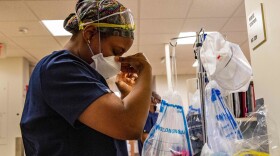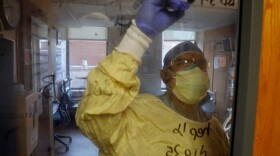
Will Stone
Will Stone is a former reporter at KUNR Public Radio.
-
People who get infected with omicron are less likely to go to the hospital, go on a ventilator or die. But with the current huge volume of patients, hospitals are still struggling to treat them all.
-
A Seattle hospital confronts the omicron surge. While COVID-19 patients aren't as sick compared to earlier waves, there is a record number of patients overall, and not enough staff to care for them.
-
Omicron may cause milder disease, but the sheer number of patients makes this wave far worse for the health care system. With packed emergency rooms, patients can wait days to get moved to a bed.
-
There are more patients and, in some places, not enough health care workers to go around. Research shows the crowding will impact care and increase mortality for all patients.
-
Some hospitals report less strain as omicron seems to cause less severe illness. But they're still overcrowded with patients. Research shows death rates rise significantly when hospitals are full.
-
Researchers are looking at data from U.S. cases to determine if the variant causes milder disease. Even if the answer is yes, they say, rates of hospitalization could be high during the surge.
-
The burning questions: What makes this newly identified variant so transmissible? And what does it mean for preventing spread?
-
Understaffed hospitals are already coping with increased patient demand heading into the holidays. They have few options to expand if omicron creates a huge new wave of COVID patients.
-
Many U.S. hospitals are already struggling with a wave of COVID-19 patients and now they are also racing to prepare for the omicron variant, which threatens to further accelerate hospitalizations.
-
The variant has spread through South Africa with remarkable speed — and been detected in at least 60 other countries. Specialists are trying to figure out the next stage for this unwelcome variant.







